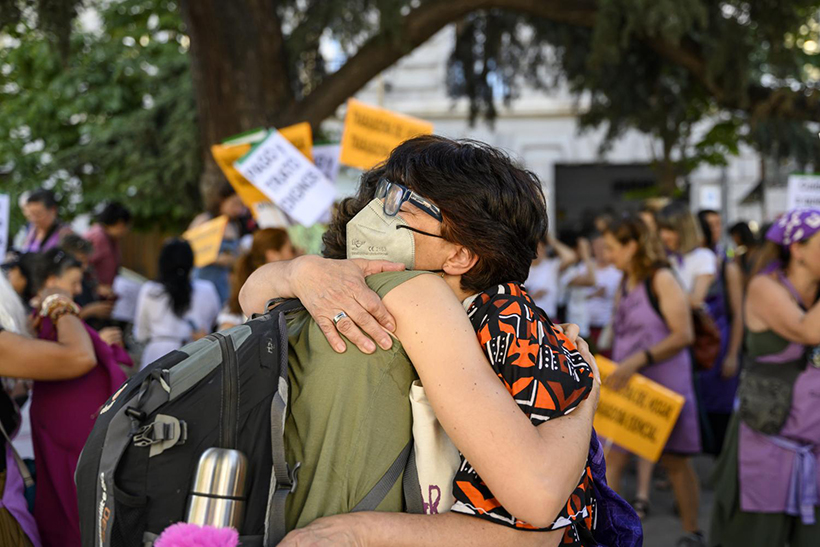Convention 189 of the International Labour Organisation unites all parties to ratify that domestic and care worker have labour rights equivalent to those of any other salaried worker.
By Gessamí Forner and Pablo Elorduy/El salto diario
Today (09/06) was a momentous day in the Congress of Deputies, which achieved a historic consensus: all the parliamentary groups ratified Convention 189 of the International Organisation of Workers’ Rights, established in 2011. There were 325 votes in favour and only one abstention. After the vote, the Chamber burst into applause and headed towards the gallery, where a score of women workers were waiting for the moment. “We cried with joy,” said Marina Díaz, an activist with the Sintrahocu union. She considers the ratification to be “a right that has been won”, which is “an impetus for their struggle, we must continue to fight together without stopping to ensure that the law is properly enforced”.
Spain was eleven years late in its ratification or, failing that, in a parallel application, as France, for example, has done. A court ruling by the Strasbourg Court of Human Rights in February removed them from Spain for discriminating against workers in this sector, pushing Congress to set a date in the calendar to settle a labour, economic and social debt with the more than 600,000 domestic and care workers who have been working for decades without the right to unemployment benefits, with free dismissals, with minimal pensions, without occupational risk prevention and even in situations of semi-slavery, such as in-house work.
All the formations voted yes to ratify Convention 189. During the parliamentary arguments, Vox babbled about another convention on river fishing in the Minho, so the direction of its vote was unknown until the moment of the vote. In the end, the far-right formation voted in favour.
Almost all the parliamentary interventions made from the chamber’s armchairs, rather than from the lectern, due to congressional protocol, were emotional. With the exception of the PP representative, the politicians spoke looking towards the rostrum, where they listened attentively and emotionally to the women workers who were able to attend today as an audience to witness one of the milestones of their struggle.
Around a hundred women workers gathered in the vicinity of the Congress to celebrate this historic day. “It’s over, it’s over, slavery is over” and “We’re not all here, the inmates are missing” were the most chanted chants at 6pm, once the vote inside the chamber was over.
The historic activist Donatilda Gamarra took the loudspeaker to speak to her colleagues: “Thank you all for your struggle, ratification is a political achievement”, she said, before pointing out that “we not only know how to demand, but also how to put forward proposals and make them heard”.
The Minister of Labour, Yolanda Díaz, announced that the regulations that will develop the application of Convention 189 will be published “quickly”.
On leaving the Congress, the Minister of Labour, Yolanda Díaz, made a visibly happy statement: “Today is a great day. It is good to be in government to do these things. They have been fighting for us for many years and moving the world. The regulation [that is being drafted by the ministry and will develop the application of the Convention] will come out quickly to give domestic and care workers all the rights in equality, like other workers. I come from where I come from and I know very well who I represent, I’m not going to get confused”, Díaz concluded.
Mireia Vehí (CUP) was the first to speak. “The struggle is useful”, she reminded the audience. “The law on foreigners must be abolished”, she added. “The majority are women and the majority are migrants”, she pointed out with regard to the composition of this sector. She was followed by Bel Pozueta (EH Bildu). She began with a “zorionak!”, congratulations in Spanish, and ended by urging the government to do its “unfinished business”, in reference to the application of the agreement.
Iñigo Barandiaran (PNV) clarified that this application should be developed, “if possible, by consensus with all the parties”. The most emotional intervention came from the representatives of ERC, Unidas Podemos and PSOE.
María Carvalho (ERC) mentioned the Galician domestic worker who denounced the state for not having the right to unemployment and the lawyer who accompanied her on her long judicial journey, which reached Strasbourg. She recalled that the plans announced by the minister José Luis Escrivá do not include domestic workers, despite the fact that many of them are unprotected administratively. “There is an urgent need to regularise all those who are working in an irregular situation. There is an ILP in favour. Let’s all sign it”, she asked.
Gerardo Pisarello (UP) stated that the workers “have come here because it is clear to them that they are not going to be stopped” and compared them to Francia Márquez: “She had to look after other people’s children while hers were in the care of her grandmother. She will be the next vice-president of Colombia. Even no one, when they unite, can win and do so until dignity is customary”.
María Dolores Narváez (PSOE) also praised the struggle of women workers, “ratification is the fruit of your efforts”, and recalled that “without you, it would not be possible for the world to move”. For his part, Eloy Suárez (PP) also referred to the importance of the regulation of fishing in the river Miño, like Vox, but added that Convention 189 seems to him to be of “special importance”, which is why his group “will make the appropriate contributions to improve the lives of these people”.










